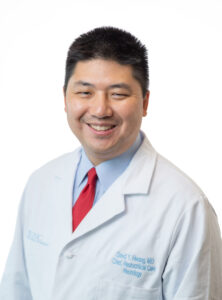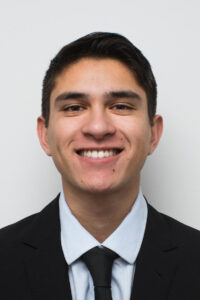A $100,000 grant from the Neurocritical Care Foundation has been awarded to David Y. Hwang MD, FAAN, FCCM, FNCS, division chief of neurocritical care in the Department of Neurology at the UNC School of Medicine, and colleagues to research an intervention to support family caregivers of patients surviving ICU admission for coma.

David Y. Hwang MD, FAAN, FCCM, FNCS, division chief of neurocritical care in the Department of Neurology at the UNC School of Medicine, and collaborators at the Massachusetts General Hospital (MGH) and University of Maryland have been awarded an INvesting in CLINical Neurocritical CarE Research (INCLINE) grant from the Neurocritical Care Foundation (NCCF). The $100,000 pilot grant, awarded by the NCCF to only one collaborative team of investigators each year, will go towards the project, “The Coma Family Program (COMA-F): an open multicenter pilot trial of a mindfulness-based resiliency program for caregivers of severe acute brain injury patients.”
“Our team is incredibly grateful that the Neurocritical Care Foundation is choosing to prioritize the support of family caregivers for coma recovery patients,” said Hwang, professor of neurology. “The preliminary data for this award was only made possible by a collaboration of 14 U.S. neuroICUs, and I could not be more thankful of their initial willingness to work together and for continued collaboration on this intervention project with the MGH Center for Health Outcomes and Interdisciplinary Research and the neurocritical care teams at MGH and the University of Maryland.”

The proposed pilot study will enroll families of severe acute brain injury patients who have survived an ICU admission to the point of tracheostomy and/or gastrostomy placement, with potentially a long recovery and uncertain outcome. Studies show that these caregivers are at high risk for persistent anxiety and depression following ICU hospitalization, even more so than similar families who elect to transition their loved ones to comfort care.
As part of the program, researchers will adapt an psychological support intervention called “Recovering Together” – an existing NIH-funded mindfulness-based resiliency program developed at MGH that is currently targeting brain injury patients who have already made a full cognitive recovery in the ICU. The Recovering Together intervention consists of six in-person or virtual sessions for both these patients and their families with a clinical psychologist that are specifically designed to support their psychosocial needs amidst their transition out of the ICU.
“The Coma Family Program builds off Recovering Together,” said Alexander Presciutti, PhD MSCS, assistant professor of psychology at Massachusetts General Hospital and INCLINE grant multiple principal investigator (MPI). “In COMA-F, our psychology team will teach participants skills similar to those in Recovering Together. However, we will instead tailor the skills to meet the unique needs of coma recovery caregivers. Whereas Recovering Together focuses on building coping skills in dyads of cognitively intact patients and caregivers, COMA-F focuses on building individual coping skills amongst a different population—those caregivers whose brain-injured loved ones have not yet recovered to the point of working with a psychologist, and who likely have a long recovery road ahead.”
The awarded INCLINE grant will help fund a 3-center open pilot trial for the team’s adapted emotional support intervention. Over the course of the grant, the team will recruit 15 caregivers of severe acute brain injury patients undergoing tracheostomy and gastrostomy placement and evaluate the COMA-F intervention based on well-defined feasibility and acceptability outcomes, as well as exit interviews with caregiver participants. Study participants will be recruited from UNC, MGH, and the University of Maryland, with study interventions delivered either in-person (at MGH) or virtually (at MGH and UNC/Maryland) by the MGH psychology team. Researchers will use their findings to refine the COMA-F intervention and eventually conduct a formal feasibility randomized controlled trial of the intervention versus minimally enhanced usual control.
Media contact: Brittany Phillips, Communications Specialist, UNC Health | UNC School of Medicine